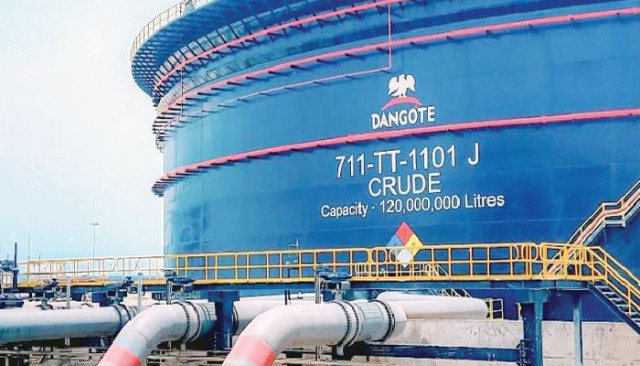The Dangote Petroleum Refinery has dismissed accusations from oil marketers claiming that the facility lacks the capacity to fulfill local fuel requirements.
Officials from the refinery stated that it is adequately supplying local needs while also exporting to other nations.
After Aliko Dangote, the founder of the refinery, suggested that certain influential groups among major marketers and traders were undermining the $20 billion refinery, Olufemi Adewole, Executive Secretary of the Depot and Petroleum Products Marketers Association of Nigeria (DAPPMAN), responded that marketers are primarily focused on maintaining their businesses by importing fuel.
Adewole rejected the notion of a 'cabal' in the industry, acknowledging instead that private depot owners, who have invested significantly over the years, have selflessly kept fuel distribution operational across Nigeria.
He claimed that despite the refinery's impressive capacity of 650,000 barrels, it has not managed to meet the current scaled-down local consumption requirements, placing the onus on private depot owners to fill in the gaps.
He quoted the NMDPRA's chief executive, who indicated that the refinery is not adequately meeting even reduced local consumption levels, emphasizing that private depot owners continue to serve the nation's fuel distribution needs.
In contrast, a confidential source from the Dangote refinery asserted that they continue to export fuel after meeting local market demands, questioning how the marketers derived their conclusion regarding the refinery's capacity.
This official expressed concern that local consumption figures have been skewed over time, particularly during the fuel subsidy era, and predicts that the real consumption data will eventually be unveiled to the public.
He emphasized that the refinery's output exceeds local market needs while also facilitating exports. Another official expressed that President Bola Tinubu's decision to halt imports of goods that can be produced domestically is crucial for economic growth, though cautioned about potential resistance from importers against this 'Nigeria First Policy.'
Adewole previously accused Dangote of attempting to dominate the downstream sector through aggressive pricing tactics, which have led to losses for marketers striving to stay competitive.
The Dangote representative countered by asserting that some importers prioritize profits over the welfare of the populace and previously engaged in round-tripping during the fuel subsidy days.
The source challenged the current daily fuel consumption estimates, calling for transparency on actual figures. A consultant to the refinery questioned DAPPMAN and other marketers on how they gauge the refinery’s stock levels and reach their conclusions about its inability to meet local demands.
Aliko Dangote's stated during a recent refinery visit that the facility will soon achieve its full production capacity of 650,000 barrels per day, noting that Nigeria will not consume more than half of its refined output.
He stated, “We can satisfy more than the local needs of Nigeria,” as the refinery aims to export 60% of its products to other African countries.
Vice President of the Dangote Group, Davakumar Edwin, reaffirmed that the refinery can fulfill local requirements entirely, presenting production figures that show daily outputs substantially exceeding local consumption levels.
He noted that, as of February, the refinery was capable of supplying substantial amounts of petrol, diesel, and aviation fuel daily, along with sufficient storage to meet demand for extended periods.
During the unveiling of the refinery's initial PMS last year, Dangote indicated that the facility would clarify Nigeria's real petrol consumption.
He expressed concerns about illicit practices previously affecting the market and emphasized the refinery's capacity to provide accurate tracking of fuel distribution.
Nigerian Midstream and Downstream Petroleum Regulatory Authority (NMDPRA) officials disclosed a drop in petrol importation and fluctuating daily consumption rates, leading to confusion regarding the actual amount of fuel being imported versus what is consumed domestically.
Despite ongoing challenges with fuel smuggling and conflicting statements about consumption data, Dangote believes the influence of powerful market groups trying to undermine the refinery's operation can be overcome. He asserted confidence in winning this ongoing battle against those benefitting from subsidized oil imports.
In contrast, DAPPMAN denied the existence of cabals, highlighting instead the need for fair competition among vested interests seeking to protect their investments.




















